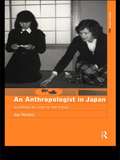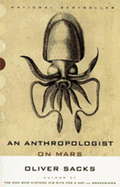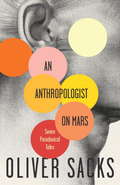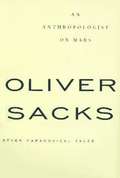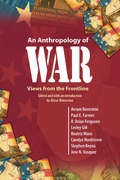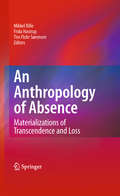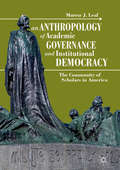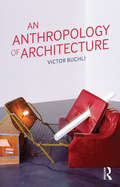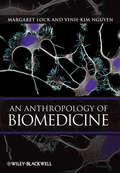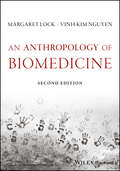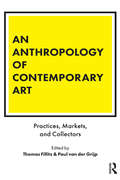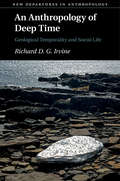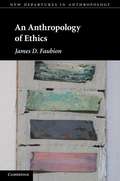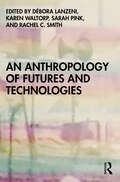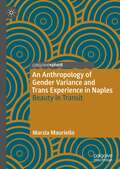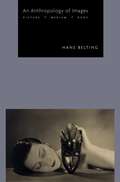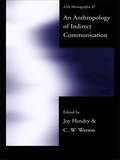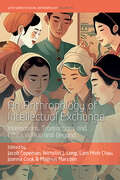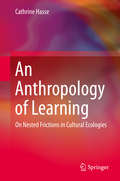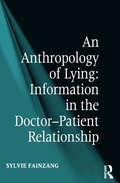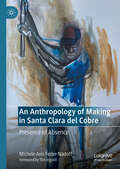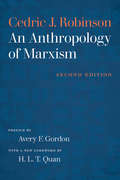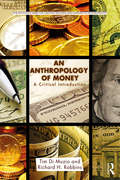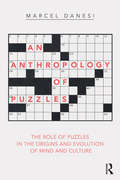- Table View
- List View
An Anthropologist in Japan: Glimpses of Life in the Field (The ASA Research Methods)
by Joy HendryIn this highly personal account Joy Hendry relates her experiences of fieldwork in a Japanese town and reveals a fascinating cross-section of Japanese life. She sets out on a study of politeness but a variety of unpredictable events including a volcanic eruption, a suicide and her son's involvement with the family of a poweful local gangster, begin to alter the direction of her research. The book demonstrates the role of chance in the acquisition of anthropological knowledge and demonstrates how moments of insight can be embedded in everyday activity. An Anthropologist in Japan illuminates the education system, religious beliefs, politics, the family and the neighbourhood in modern Japan.
An Anthropologist on Mars
by Oliver SacksTo these seven narratives of neurological disorder Dr. Sacks brings the same humanity, poetic observation, and infectious sense of wonder that are apparent in his bestsellers Awakenings and The Man Who Mistook His Wife for a Hat. These men, women, and one extraordinary child emerge as brilliantly adaptive personalities, whose conditions have not so much debilitated them as ushered them into another reality.
An Anthropologist on Mars
by Oliver SacksTo these seven narratives of neurological disorder Dr. Sacks brings the same humanity, poetic observation, and infectious sense of wonder that are apparent in his bestsellers Awakenings and The Man Who Mistook His Wife for a Hat. These men, women, and one extraordinary child emerge as brilliantly adaptive personalities, whose conditions have not so much debilitated them as ushered them into another reality.
An Anthropologist on Mars: Seven Paradoxical Tales
by Oliver SacksHere are seven detailed and fascinating portraits of neurological patients, including a surgeon consumed by the compulsive tics of Tourette's syndrome unless he is operating; an artist who loses all sense of color in a car accident, but finds a new sensibility and creative power in black and white; and an autistic professor who cannot decipher the simplest social exchange between humans, but has built a career out of her intuitive understanding of animal behavior.
An Anthropologist on Mars: Seven Paradoxical Tales
by Oliver SacksTo these seven narratives of neurological disorder Dr. Sacks brings the same humanity, poetic observation, and infectious sense of wonder that are apparent in his bestsellers Awakenings and The Man Who Mistook His Wife for a Hat. These men, women, and one extraordinary child emerge as brilliantly adaptive personalities, whose conditions have not so much debilitated them as ushered them into another reality.
An Anthropology Of War
by Alisse WaterstonAs we move deeper into the twenty-first century, power, lethal force, and injustice continue to explode violently into war, and the prospects for lasting peace look even bleaker. The horrors of modern warfare - the death, dehumanization, and destruction of social and material infrastructures - have done little to bring an end to armed conflict. In this volume, leading chroniclers of war provide thoughtful and powerful essays that reflect on their ethnographic work at the frontlines. The contributors recount not only what they have seen and heard in war zones but also what is being read, studied, analyzed and remembered in such diverse locations as Colombia and Guatemala, Israel and Palestine, Iraq, Afghanistan, and Haiti. In detailed reports from the field, they reflect on the important issue of "accountability" and offer explanations to discern causes, patterns, and practices of war. Through this unique lens, the contributors provide the insight and analysis needed for a deeper understanding of one of the greatest issues of our times. Contributors: Avram Bornstein, Paul E. Farmer, R. Brian Ferguson, Lesley Gill, Beatriz Manz, Carolyn Nordstrom, Stephen Reyna, Jose N. Vasquez
An Anthropology of Absence: Materializations of Transcendence and Loss
by Frida Hastrup Mikkel Bille Tim Flohr SoerensenIn studying material culture, anthropologists and archaeologists use meaningful physical objects from a culture to help understand the less tangible aspects of that culture, such as societal structure, rituals, and values. What happens when these objects are destroyed, by war, natural disaster, or other historical events? Through detailed explanations of eleven international case studies, the contributions reveal that the absence of objects can be just as telling as their presence, while the objects created to memorialize a loss also have important cultural implications. Covering everything from organ donation, to funerary rituals, to prisoners of war, The Archaeology of Absence is written at an important intersection of archaeological and anthropological study. Divided into three sections, this volume uses the "presence" of absence to compare cultural perceptions of: material qualities and created memory, the mind/body connection, temporality, and death. This rich text provides a strong theoretical framework for anthropologists and archaeologists studying material culture.
An Anthropology of Academic Governance and Institutional Democracy: The Community of Scholars in America
by Murray J. LeafThis anthropological study of university governance organizations has four main purposes. It aims to describe the principles of effective faculty governance organizations and shared governance; to help mobilize opposition to a large and extremely well-funded system of political attacks aimed at destroying faculty governance organizations; to demonstrate the value of the theory of human social organizations; and to enable universities to become more effective in generating the intellectual advances we must make in order to solve the current global crisis of sustainability and political instability. Political democracy depends on an educated public, and academic democracy is integral to producing such knowledge.
An Anthropology of Architecture
by Victor BuchliEver since anthropology has existed as a discipline, anthropologists have thought about architectural forms. This book provides the first overview of how anthropologists have studied architecture and the extraordinarily rich thought and data this has produced.With a focus on domestic space - that intimate context in which anthropologists traditionally work - the book explains how anthropologists think about public and private boundaries, gender, sex and the body, the materiality of architectural forms and materials, building technologies and architectural representations. Each chapter uses a broad range of case studies from around the world to examine from within anthropology what architecture 'does' - how it makes people and shapes, sustains and unravels social relations.An Anthropology of Architecture is key reading for students of anthropology, material culture, geography, sociology, architectural theory, design and city planning.
An Anthropology of Biomedicine
by Margaret Lock Vinh-Kim NguyenAn Anthropology of Biomedicine is an exciting new introduction to biomedicine and its global implications. Focusing on the ways in which the application of biomedical technologies bring about radical changes to societies at large, cultural anthropologist Margaret Lock and her co-author physician and medical anthropologist Vinh-Kim Nguyen develop and integrate the thesis that the human body in health and illness is the elusive product of nature and culture that refuses to be pinned down. Introduces biomedicine from an anthropological perspective, exploring the entanglement of material bodies with history, environment, culture, and politics Develops and integrates an original theory: that the human body in health and illness is not an ontological given but a moveable, malleable entity Makes extensive use of historical and contemporary ethnographic materials around the globe to illustrate the importance of this methodological approach Integrates key new research data with more classical material, covering the management of epidemics, famines, fertility and birth, by military doctors from colonial times on Uses numerous case studies to illustrate concepts such as the global commodification of human bodies and body parts, modern forms of population, and the extension of biomedical technologies into domestic and intimate domains Winner of the 2010 Prose Award for Archaeology and Anthropology
An Anthropology of Biomedicine
by Margaret Lock Vinh-Kim NguyenIn this fully revised and updated second edition of An Anthropology of Biomedicine, authors Lock and Nguyen introduce biomedicine from an anthropological perspective, exploring the entanglement of material bodies with history, environment, culture, and politics. Drawing on historical and ethnographic work, the book critiques the assumption made by the biological sciences of a universal human body that can be uniformly standardized. It focuses on the ways in which the application of biomedical technologies brings about radical changes to societies at large based on socioeconomic inequalities and ethical disputes, and develops and integrates the theory that the human body in health and illness is not an ontological given but a moveable, malleable entity. This second edition includes new chapters on: microbiology and the microbiome; global health; and, the self as a socio-technical system. In addition, all chapters have been comprehensively revised to take account of developments from within this fast-paced field, in the intervening years between publications. References and figures have also been updated throughout. This highly-regarded and award-winning textbook (Winner of the 2010 Prose Award for Archaeology and Anthropology) retains the character and features of the previous edition. Its coverage remains broad, including discussion of: biomedical technologies in practice; anthropologies of medicine; biology and human experiments; infertility and assisted reproduction; genomics, epigenomics, and uncertain futures; and molecularizing racial difference, ensuring it remains the essential text for students of anthropology, medical anthropology as well as public and global health.
An Anthropology of Contemporary Art: Practices, Markets, and Collectors (Criminal Practice Ser.)
by Thomas Fillitz Paul van der GrijpDrawing on the exciting developments that have occurred in the anthropology of art over the last twenty years, this study uses ethnographic methods to explore shifts in the art market and global contemporary art. Recognizing that the huge diversity of global phenomena requires research on the ground, An Anthropology of Contemporary Art examines the local art markets, biennials, networks of collectors, curators, artists, patrons, auction houses, and museums that constitute the global art world.Divided into four parts – Picture and Medium; World Art Studies and Global Art; Art Markets, Maecenas and Collectors; Participatory Art and Collaboration – chapters go beyond the standard emphasis on Europe and North America to present first-hand fieldwork from a wide range of areas, including Brazil, Turkey, and Asia and the Pacific.With contributions from distinguished anthropologists such as Philippe Descola and Roger Sansi Roca, this book provides a fresh approach to key topics in the discipline. A model for demonstrating how contemporary art can be studied ethnographically, this is a vital read for students in anthropology of art, visual anthropology, visual culture, and related fields.
An Anthropology of Deep Time: Geological Temporality and Social Life (New Departures in Anthropology)
by Richard D. IrvineIn the face of debates about the Anthropocene - a geological epoch of our own making - and contemporary concerns about ecological crisis and the Sixth Mass Extinction, it is more important than ever to locate the timeframe of human activity within the deep time of planetary history. This path-breaking book is a timely critical review of the anthropology of time, exploring our human relationship with the timescale of geological formation. Richard D. G. Irvine shows how the time-horizons of social life are a matter of crucial concern, and lays bare the ways in which human activity becomes severed from the long-term geological and ecological rhythms on which it depends.
An Anthropology of Ethics
by James D. FaubionThrough an ambitious and critical revision of Michel Foucault's investigation of ethics, James Faubion develops an original program of empirical inquiry into the ethical domain. From an anthropological perspective, Faubion argues that Foucault's specification of the analytical parameters of this domain is the most productive point of departure in conceptualizing its distinctive features. He further argues that Foucault's framework is in need of substantial revision to be of genuinely anthropological scope. In making this revision, Faubion illustrates his program with two extended case studies: one of a Portuguese marquis and the other of a dual subject made up of the author and a millenarian prophetess. The result is a conceptual apparatus that is able to accommodate ethical pluralism and yield an account of the limits of ethical variation, providing a novel resolution of the problem of relativism that has haunted anthropological inquiry into ethics since its inception.
An Anthropology of Futures and Technologies
by Sarah Pink Karen Waltorp Débora Lanzeni Rachel C. SmithThis book examines emerging automated technologies and systems and the increasingly prominent roles that each plays in our lives and our imagined futures. It asks how technological futures are being constituted and the roles anthropologists can play in their making; how anthropologists engage with emerging technologies within their fieldwork contexts in research which seeks to influence future design; how to create critical and interventional approaches to technology design and innovation; and how a critical anthropology of the way that emerging technologies are experienced in everyday life circumstances offers new insights for future-making practices. In pursuing these questions, this book responds to a call for new anthropologies that respond to the current and emerging technological environments in which we live, environments for which thinking critically about the possible, plausible, and impossible futures are no longer sufficient. Taking the next step, this book asserts that anthropology must now propose alternative ways, rooted in ethnography, to approach and engage with what is coming and to contest dominant narratives of industry, policy, and government, and to respond to our contemporary context through a public, vocal, and interventional approach.
An Anthropology of Gender Variance and Trans Experience in Naples: Beauty in Transit
by Marzia MaurielloThis book recounts the author’s fieldwork among the trans and gender-variant communities in Naples. This is where a gender-variant figure, the femminiello, has found a safe environment within the city’s historical poorest neighborhoods, the so-called “quartieri popolari”, which were and continue to be culturally and socially connoted. The femminielli, who can be read as “suspended” figures between the feminine and the masculine, provide the background for a discourse on the meanings that genders and sexualities have assumed in modern Naples. This is done with significant openings to theoretical reasoning that is both extraterritorial and multidisciplinary. Starting from the micro context, the aim of the book is to explore the breadth and complexity of the gender variant and trans experience, with particular reference to the changing meanings of the body, which are also tied to the collective images of beauty in contemporary times.
An Anthropology of Images: Picture, Medium, Body
by Hans BeltingA compelling theory that places the origin of human picture making in the bodyIn this groundbreaking book, renowned art historian Hans Belting proposes a new anthropological theory for interpreting human picture making. Rather than focus exclusively on pictures as they are embodied in various media such as painting, sculpture, or photography, he links pictures to our mental images and therefore our bodies. The body is understood as a "living medium" that produces, perceives, or remembers images that are different from the images we encounter through handmade or technical pictures. Refusing to reduce images to their material embodiment yet acknowledging the importance of the historical media in which images are manifested, An Anthropology of Images presents a challenging and provocative new account of what pictures are and how they function.The book demonstrates these ideas with a series of compelling case studies, ranging from Dante's picture theory to post-photography. One chapter explores the tension between image and medium in two "media of the body," the coat of arms and the portrait painting. Another, central chapter looks at the relationship between image and death, tracing picture production, including the first use of the mask, to early funerary rituals in which pictures served to represent the missing bodies of the dead. Pictures were tools to re-embody the deceased, to make them present again, a fact that offers a surprising clue to the riddle of presence and absence in most pictures and that reveals a genealogy of pictures obscured by Platonic picture theory.
An Anthropology of Indirect Communication (ASA Monographs #Vol. 37)
by Joy Hendry C. W. WatsonSometimes we convey what we mean not by what we say but by what we do. This type of indirect communication is sometimes called 'indirection'. From patent miscommunication, through potent ambiguity to pregnant silence this incisive collection examines from a rare anthropological perspective the many aspects of indirect communication. From a Mormon Theme Park to carnival time on Montserrat the contributors analyse indirection by illustrating how food, silence, sunglasses, martial arts and rudeness call constitute powerful ways of conveying meaning. An Anthropology of Indirect Communication is an engaging text which provides a challenging introduction to this subject.
An Anthropology of Intellectual Exchange: Interactions, Transactions and Ethics in Asia and Beyond (WYSE Series in Social Anthropology #15)
by Magnus Marsden Jacob Copeman, Nicholas J. Long, Lam Minh Chau, Joanna CookDialogues, encounters and interactions through which particular ways of knowing, understanding and thinking about the world are forged lie at the centre of anthropology. Such ‘intellectual exchange’ is also central to anthropologists’ own professional practice: from their interactions with research participants and modes of pedagogy to their engagements with each other and scholars from adjacent disciplines. This collection of essays explores how such processes might best be studied cross-culturally. Foregrounding the diverse interactions, ethical reasoning, and intellectual lives of people from across the continent of Asia, the volume develops an anthropology of intellectual exchange itself.
An Anthropology of Learning: On Nested Frictions in Cultural Ecologies
by Cathrine HasseThis book has one explicit purpose: to present a new theory of cultural learning in organisations which combines practice-based learning with cultural models - a cognitive anthropological schema theory of taken-for-granted connections - tied to the everyday meaningful use of artefacts. The understanding of culture as emerging in a process of learning open up for new understandings, which is useful for researchers, practitioners and students interested in dynamic studies of culture and cultural studies of organisations. The new approach goes beyond culture as a static, essentialist entity and open for our possibility to learn in organisations across national cultures, across ethnicity and across the apparently insurmountable local educational differences which makes it difficult for people to communicate working together in an increasingly globalized world. The empirical examples are mainly drawn from organisations of education and science which are melting-pots of cultural encounters.
An Anthropology of Lying: Information in the Doctor-Patient Relationship
by Sylvie FainzangIn the era of health democracy, where a patient’s right to be informed is not only widely advocated but also guaranteed by law, what is the real situation regarding patient information? Do patients receive the information that they request with regard to their diagnosis, prognosis or treatments? And what information do patients themselves give to their doctors? Drawing on observational research in hospitals and covering the exchanges between doctors and patients on the subject of cancer treatment and that of other pathologies, this book reveals that the practice of telling lies is widespread amongst parties on both sides of the medical relationship. With attention to the manner in which information of various types is withheld and the truth concealed on either side of the doctor-patient relationship, the author explores the boundaries between what is said and what is left unsaid, and between those who are given information and those who are lied to. Considering the misunderstandings that occur in the course of medical exchanges and the differences between the lies told by doctors and patients, An Anthropology of Lying: Information in the Doctor-Patient Relationship analyses the role of mendacity in the exercise of, and resistance to power. A fascinating study of the mechanisms at work and social conditions surrounding the accomplishment of lying in medical settings, this book casts fresh light on a subject that has so far been overlooked. As such, it will appeal not only to sociologists and anthropologists of health and medicine, but also to medical professionals.
An Anthropology of Making in Santa Clara del Cobre: Presence of Absence
by Michele Avis Feder-NadoffThis book offers a nuanced reflection on the meaning of making and artisan agency, demonstrating how copper-smithing produces not only objects, but also lives, worlds, meanings, and social transformation. Through long-term ethnography, grounded in apprenticeship to master coppersmith Jesús Pérez Ornelas, Feder-Nadoff’s intimate description of communal and artisanal life in Santa Clara del Cobre, Michoacán, México provides a critical reappraisal of aesthetics and compelling ways to think about how aura and agency are produced. By mapping flows and frictions between persons, places, and things, this study closes the gap between economic and socio-political analysis of craft, on the one hand, and aesthetic, material, and phenomenological studies of making, on the other. Although craft historically plays a prominent national, even ideological role in Mexico, as in many countries, most artisans ironically remain absent, often living in marginalized, precarious circumstances. By tracing the cycles of life, death, and afterlife, of these maker-protagonists, their bodies of knowledge, skilled performances, and objects, this poetic monograph testifies to their presence.
An Anthropology of Marxism (Race And Representation Ser.)
by Cedric J. RobinsonAn Anthropology of Marxism offers Cedric Robinson's analysis of the history of communalism that has been claimed by Marx and Marxists. Suggesting that the socialist ideal was embedded both in Western and non-Western civilizations and cultures long before the opening of the modern era and did not begin with or depend on the existence of capitalism, Robinson interrogates the social, cultural, institutional, and historical materials that were the seedbeds for communal modes of living and reimagining society. Ultimately, it pushes back against Marx's vision of a better society as rooted in a Eurocentric society, and cut off from its own precursors. Accompanied by a new foreword by H.L.T. Quan and a preface by Avery Gordon, this invaluable text reimagines the communal ideal from a broader perspective that transcends modernity, industrialization, and capitalism.
An Anthropology of Money: A Critical Introduction (Routledge Series for Creative Teaching and Learning in Anthropology)
by Richard H. Robbins Tim Di MuzioAn Anthropology of Money: A Critical Introduction shows how our present monetary system was imposed by elites and how they benefit from it. The book poses the question: how, by looking at different forms of money, can we appreciate that they have different effects? The authors demonstrate how modern money requires perpetual growth, an increase in inequality, environmental devastation, increasing commoditization, and, consequently, the perpetual consumption of ever more stuff. These are not intrinsic features of money, but, rather, of debt-money. This text shows that, through studying money in other cultures, we can have money that better serves the broader goals of society.
An Anthropology of Puzzles: The Role of Puzzles in the Origins and Evolution of Mind and Culture
by Marcel DanesiAn Anthropology of Puzzles argues that the human brain is a "puzzling organ" which allows humans to literally solve their own problems of existence through puzzle format. Noting the presence of puzzles everywhere in everyday life, Marcel Danesi looks at puzzles in society since the dawn of history, showing how their presence has guided large sections of human history, from discoveries in mathematics to disquisitions in philosophy. Danesi examines the cognitive processes that are involved in puzzle making and solving, and connects them to the actual physical manifestations of classic puzzles. Building on a concept of puzzles as based on Jungian archetypes, such as the river crossing image, the path metaphor, and the journey, Danesi suggests this could be one way to understand the public fascination with puzzles. As well as drawing on underlying mental archetypes, the act of solving puzzles also provides an outlet to move beyond biological evolution, and Danesi shows that puzzles could be the product of the same basic neural mechanism that produces language and culture. Finally, Danesi explores how understanding puzzles can be a new way of understanding our human culture.
